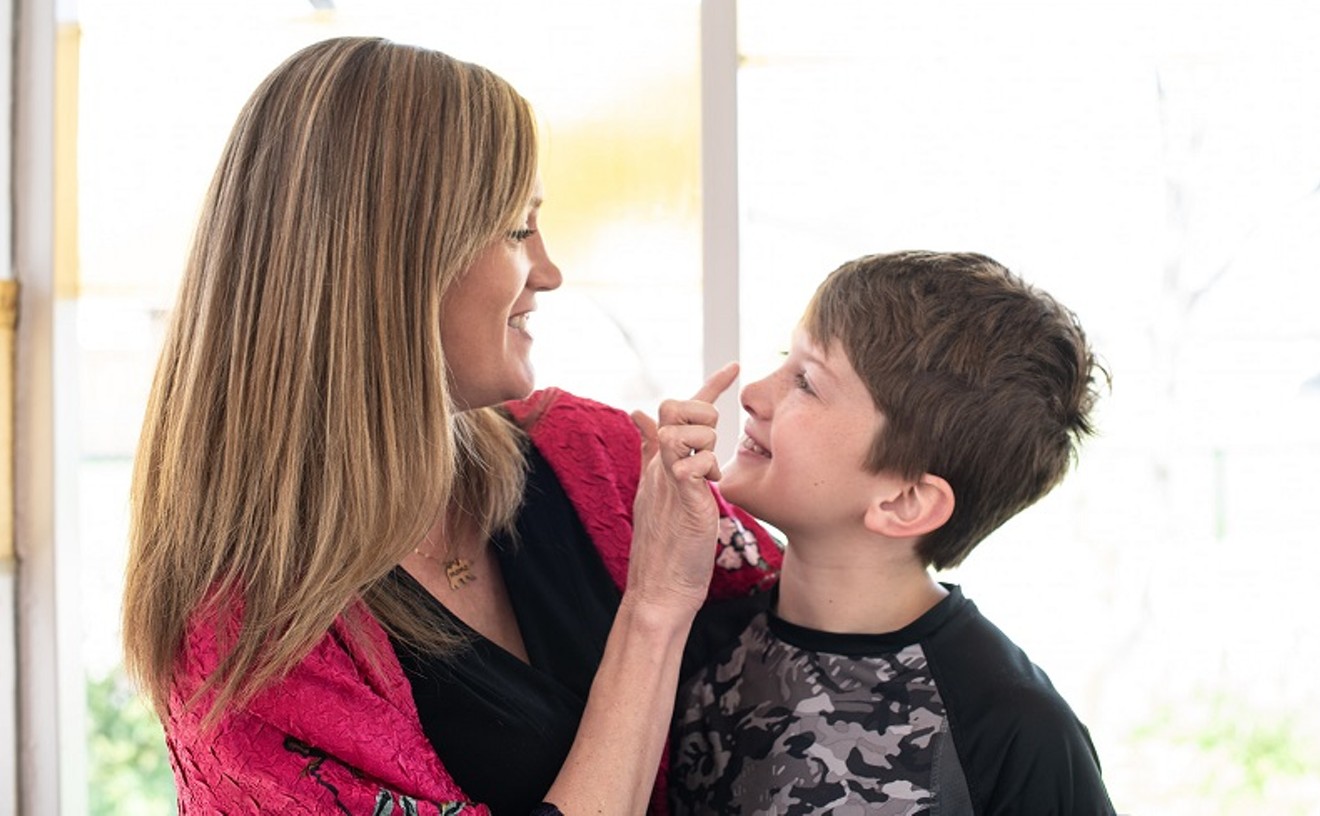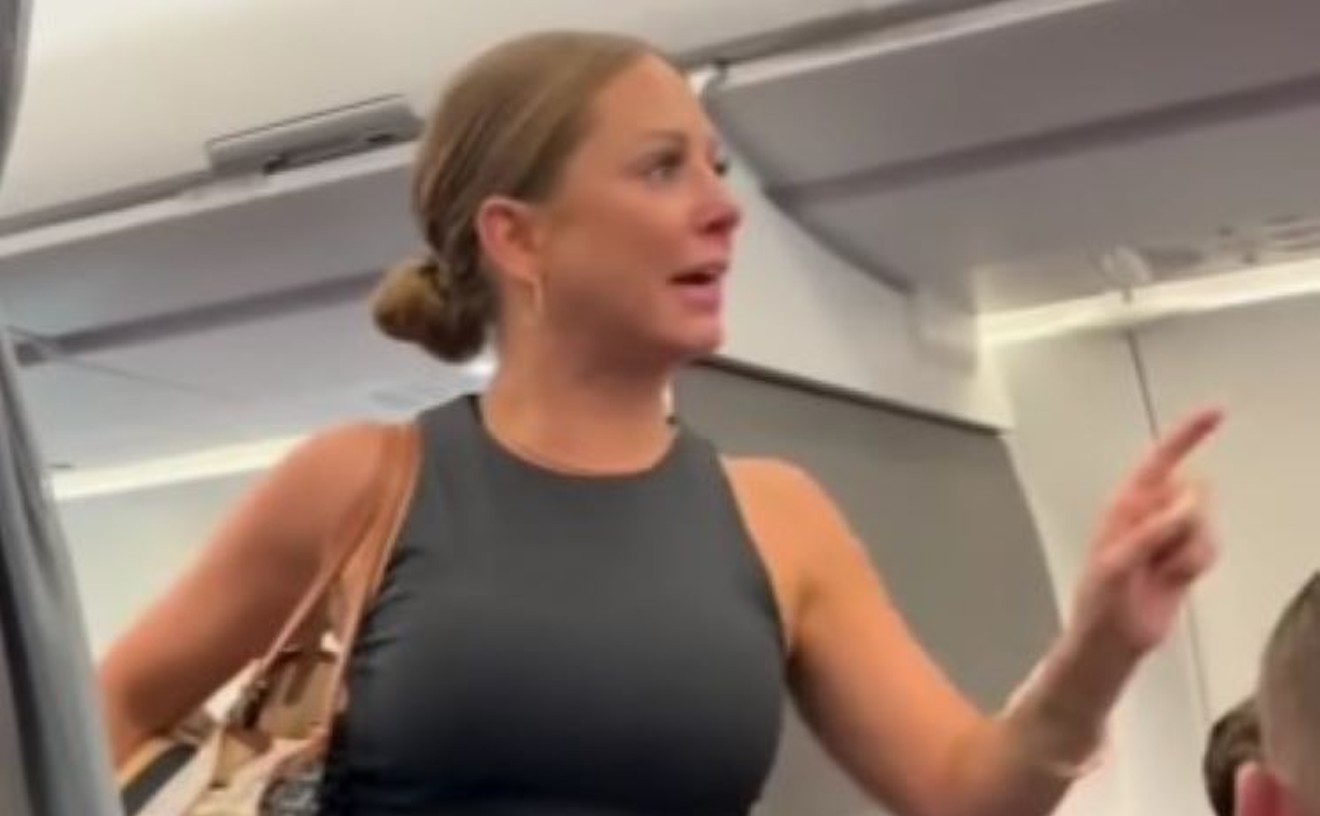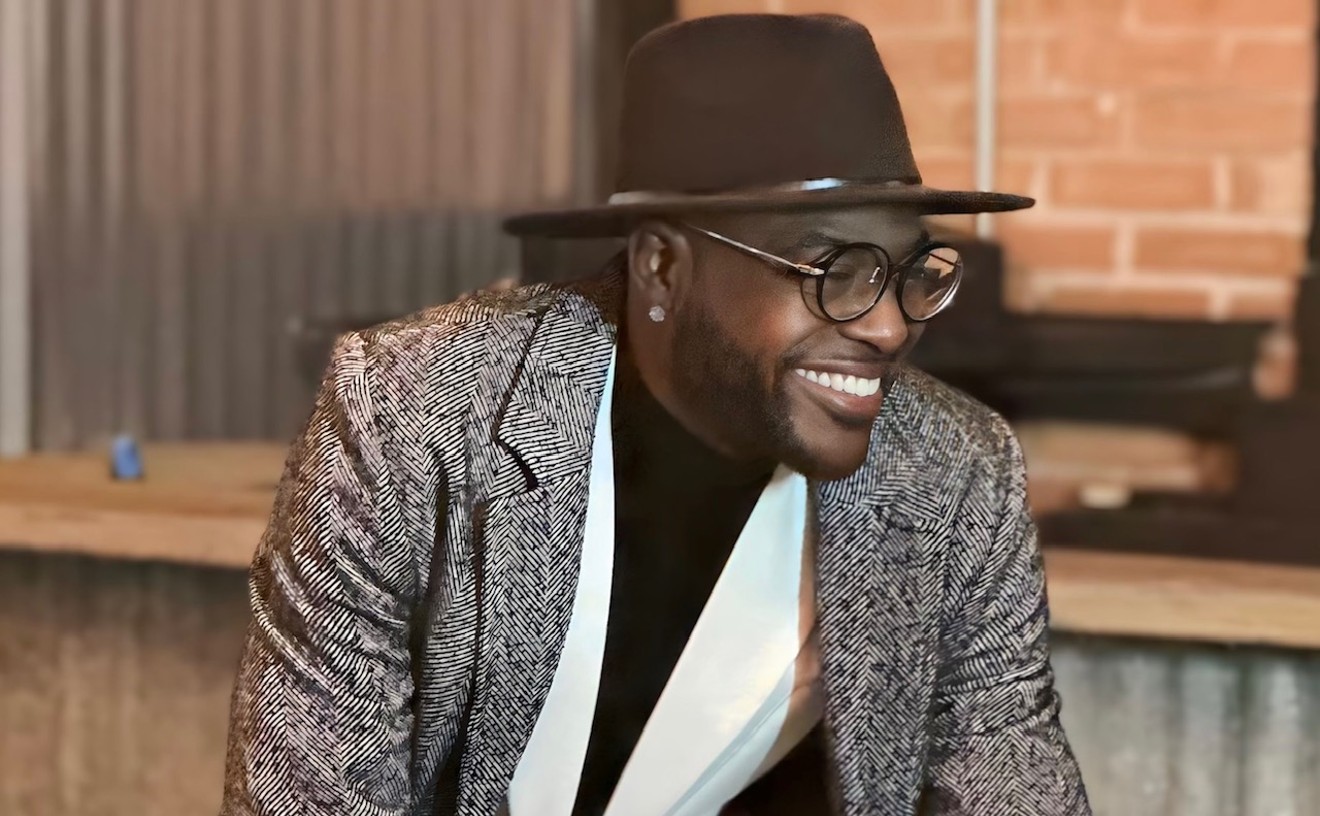Do not get him wrong. Easterwood is not above selling the disc; ask him nicely, perhaps during one of his shows with Meredith Miller, and one can be yours for a nominal fee. But sometimes, a man makes music for himself--he hears things in his head, pulls an instrument from the wall, and hits record--and never thinks there might be an audience out there that wants to hear what pours out of his head and his hands. He doesn't judge his work as great or terrible, doesn't consider there might be money to be made, doesn't engage in that awful struggle that turns art into a business transaction. He just does it. That the results are absolute brilliance--imagine Freedy Johnston fronting Uncle Tupelo covering Gram Parsons and Velvet Underground songs, and that's just the first three tracks--mean nothing to him.
"People say, 'You need to do something,'" Easterwood says, laughing slightly. "I say, 'I have. I've been putting shit out the last 10 years.' Where does it end? Do I have to be on MTV and in your face to mean I was successful? That's a spiritual question, I guess. I am not against furthering my stuff, that's for sure. But you know how much bullshit there is from all levels. I am always happy when someone is into the music and genuinely likes it. I am not opposed to developing my thing, but it's not in my best interest to go out and hustle it."
And so Absolute Blue exists only in the most limited of quantities, though it is undoubtedly one of the finest local releases of the past decade. No, strike that. Like Bedhead's Transaction de Novo or Legendary Crystal Chandelier's Love or the Decimal Equivalent or Ronnie Dawson's Rockinitis, it is not one of those hometown records that must be graded on a curve; Absolute Blue is not great for a local musician. Rather, it's a low-budget, hi-fidelity, perfect gem created by a man who has reconciled the fact that you don't need to be heard outside of Deep Ellum to be validated as a musician. It's the sort of record a guy makes after his pop band gets written in the local history books in disappearing ink (POWWOW, it was called, and the old-timers nod in vague recognition) and his banjo-fueled blues-rock project dies on the vine after so much expectation (Junky Southern's 1996 debut, Pawn Shop From Heaven, featuring such performers as Earl Harvin, Milo Deering, and Mike Daane, will forever remain an unheralded gem).
Absolute Blue is really no more than a collection of demos, songs Easterwood has recorded--mostly by himself, with only minimal assistance from drummers Bryan Wakeland and Kenny Stern and Junky Southern bassist Dave Monsey on a few tracks--since the completion of Pawn Shop. Disappointed with Pawn Shop's reception--it was released on the locally based Parallax label, which is almost like not having your record released at all--Easterwood set aside the tapes. Then, one night, he was watching a Lou Reed documentary on KERA-Channel 13 and was astonished to discover that by the age of 30, Reed had released "something like 23 records," Easterwood recalls, still impressed at the revelation.
"And I thought, 'Jesus, I haven't done anything,'" he says. "It inspired me to get off my ass." He began sending some of the demos to ex-KERA-FM disc jockey Liza Richardson, now a DJ at KCRW-FM in Los Angeles and a talent scout for Geffen Records. But Easterwood wasn't looking for a deal, wasn't even seeking some kind of validation. He simply wanted someone to know he wasn't finished yet, even if Junky Southern had blown through faster than a thunderstorm during summer.
On the surface, Easterwood's story is like that of so many local musicians whose careers stalled out at the corner of Elm and Good-Latimer. He was a young kid in a young band that played Dada and released a not-bad tape during the late '80s and early '90s; formed another band, Young Cynics, when POWWOW broke up; then headed for the West Coast when it seemed as though his meter had run out in Deep Ellum. In 1994, he headed to San Francisco to hook up with another Texas transplant. But almost from the moment he landed, things went terrible awry: The San Francisco treat he envisioned never came to pass when, two weeks after arriving in the Bay Area, he lost his right testicle to testicular torsion, and the band he went out there to form never happened. He ended up teaching guitar and slicing meat at a local deli. "It was," Easterwood deadpans, "a bad scene."
He returned to Dallas less than a year later, toured Europe twice with Mark "MC 900 Ft Jesus" Griffin, recorded with Griffin for his allegedly forthcoming record, and ended up forming Junky Southern with Monsey, Leroy Shakespeare and Ship of Vibes drummer Gerald Iragorri, and guitarist Doug Neil. Almost from the get-go, the band was misunderstood--when it wasn't being ignored. The band would perform with the Stars and Bars draped behind it, and half the audience would think they were Skynyrd reincarnate while the other half giddily insisted they were redneck racists; no one got the joke, the message, and Easterwood was devastated by the result. "It was weird," he recalls. "Some people saw the flag and came up to me smiling. No, it was a play on those words--Junky Southern. But that gave people the image this was going to be a lot of guitar stuff and drinking Jack Daniel's."
So he retreated into his home studio, laying down tracks all by his lonesome in a bedroom where instruments of all shapes and sizes hang on his wall. He would pull down a banjo, perhaps, or maybe a toy accordion or a violin and record on his 16-track board whatever sounds popped into his head. He would also take a gig playing with Meredith Miller, happy to hand over the responsibilities of fronting a band to someone else; leave that headache to someone else. He needed more time to write, to play, to record without worrying whether someone out there would appreciate what was going on in here.
The results were songs as heartbreakingly fragile as "Absolute Blue," as sparse and unnerving as the psychedelic "Listen to 'My' Rock N' Roll," as distorted as the one-man rock and roll of "Young, Dumb and Beautiful," as catchy as "And You" (with its "Sweet Jane" homage), and as haunting as the front-porch bluegrass blues of "A'men" ("If I die before I wake, that bag of peanuts give 'em to my brother Jake"). In a town where everybody goes country sooner or later (even if you used to be in Gwar and Ministry), Easterwood's country-pop feels unforced, organic, just one small corner of a larger, more detailed painting. The opener "Funny Sam" and its companion "Dreammie Jeannie" sound at once like outtakes from Freedy Johnston's Can You Fly? and old Woody Guthrie tunes never before heard; rare is the artist who can actually soak up a little history without drowning in the current.
"I have an affinity toward the country song," Easterwood says. "I can't play it worth a shit, but I have an idea of what I would like to arrive at, which are those sounds you hear now [on Absolute Blue] in a lush, orchestrated setting with killer words on top of it. I've always been one for lyrics, actually, and I want to capture what's going on with the music. I would like to do it for the rest of my life. I can't even talk about it." With an album this good, he doesn't have to. Absolute Blue says enough.
Reed Easterwood is scheduled to perform September 23 at the Gypsy Tea Room with his own band, Meredith Miller, and the Poor Devils, which features Kenny Withrow.
Big Bucks, Big balls
James "Big Bucks" Burnett--the man who refused to bury the eight-track tape even after the carcass was rotting--will release his self-proclaimed "easy metal" debut The Night We Taught Ourselves to Sing on Rich Haupt's Irving-based Rockadelic label in mid-October (it's a co-release with Burnett's own Inactive label). Burnett's not releasing the album under his own name, though; instead, the record will be credited to The Volares (so named for the car), and it features his producer, Dare Mason, and such guest stars as Marty Wilson-Piper from The Church, Bill Breeze from Coil, and Ali Abdel Salam, one of the Egyptian percussionists who toured with Jimmy Page and Robert Plant in 1995.
But one track from the CD has already been released, sort of: The ornate, lush, durned near catchy "Teepee by the River" appeared on one of those Hit Disc samplers released to a few thousand radio stations nationwide; also on that CD, put together by the Dallas-based company of the same name, were contributions from Burnett's old buddy Jimmy Page and Puff Daddy ("Come with Me" from the Godzilla soundtrack) and the Rolling Stones. "It was a blast to have my song on the disc, but it was also a moot point, because I didn't have any promotional money behind it," Burnett says. "But it's a nice way to start my scrapbook." Records will be available soon, but not before Jimmy Page gets the very first copy right off the press. "He's heard the whole thing, and he likes it," Burnett says. "He went on and on and on about it, which was really great...I tried to change the subject, and he kept coming back to it, and I took that as a good sign." The album will be released on CD, vinyl...and, of course, eight-track.
Scene, heard
With so many bands around town breaking up, moving on, or just giving up, it's nice to be able to report that one of this town's recent finest--the Cartrights, featuring the likes of Donny Ray Ford, Barry Kooda, and Alan Wooley--are getting back together, if only for one gig. The boys last played together in April 1997, but the reunion was only a temporary one. So's this one, even though the band still has an unreleased second album in the can. The Cartrights' reunion gig--"or whatever it is," shrugs Ford--will take place September 19 at the Barley House...
Speaking of breakups and farewells, Strap--the rock-and-roll combo fronted by The Artist Formerly Known as Matt "The Cat" Hillyer--plays its final show at Trees on the very same night. Hillyer, who ditched rockabilly for metal and a bodyload of tattoos when he dumped Lone Star Trio some time back, will be making full-time work of his country band 1100 Springs, which also features the likes of Bruce Alford (ex-Vibrolux) and Richie Vasquez (a former--and current?--Cartright). It's all so incestuous.
Send your hairpieces to [email protected].










